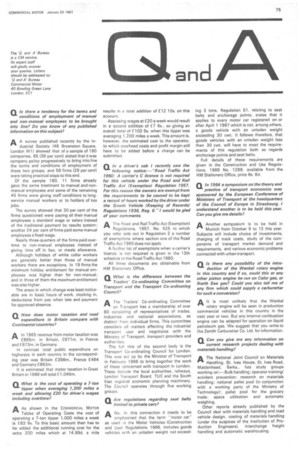Q Is there a tendency for the terms and conditions of
Page 77

If you've noticed an error in this article please click here to report it so we can fix it.
employment of manual and non-manual employees to be brought into line? Do you know of any published information on this subject?
AA survey published recently by the Industrial Society (48 Bryanston Square, London W1) showed that of a sample of 180 companies, 65 (36 per cent) stated that it was company policy progressively to bring into line the terms and conditions of employment of these two groups, and 59 firms (29 per cent) were taking practical steps to this end.
Of the sample 180, 11 firms already gave the same treatment to manual and nonmanual employees and some of the remaining 46 firms were giving staff conditions to longservice manual workers or to holders of key jobs.
The survey showed that 30 per cent of the firms questioned were paying all their manual employees a standard wage or salary instead of the traditional payment by results system; another 24 per cent of firms paid some manual employees a fixed wage.
Nearly three-quarters of the firms paid overtime to non-manual employees instead of giving time off in lieu, or meals allowance.
Although holidays of white collar workers are generally better than those of manual workers there are exceptions. In 19 firms the minimum holiday entitlement for manual employees was higher than for non-manual; and in three of them the maximum entitlement was also higher.
The areas in which change was least noticeable are in basic hours of work, clocking in, deductions from pay when late and payment for approved absence.




























































































































